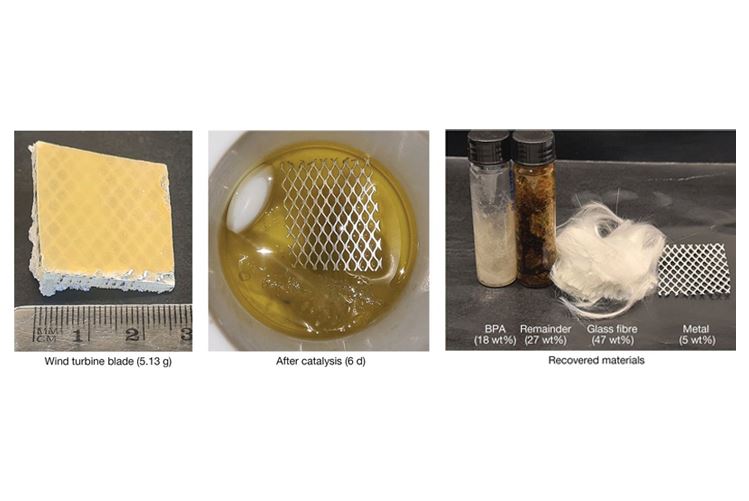Denmark – Researchers from Aarhus University and the Danish Technological Institute have developed a chemical process that can disassemble wind turbine blades, extract intact glass fibers and one of the original building blocks of the epoxy resin, and recycle them.
The recovered materials could potentially be used in the production of new wind turbine blades or in other epoxy-based materials. The findings were published in the scientific journal Nature, and the researchers have filed a patent application for the process.
Wind turbine blades, which are made of composite materials that include epoxy resin, can last for up to 20 years. But after that, they become an environmental challenge since they are difficult to break down. As a result, most wind turbine blades end up in landfills, which could lead to a global accumulation of 43 million tonnes of wind turbine blade waste by 2050, according to the International Energy Agency.
Catalyst
The new chemical process can contribute to a circular economy in the wind turbine, aerospace, automotive, and space industries, where reinforced composites are used for load-bearing structures because of their light weight and long durability. The process works on many different fiber-reinforced epoxy composites, including some materials that are reinforced with costly carbon fibers.
The researchers used a ruthenium-based catalyst and the solvents isopropanol and toluene to separate the epoxy matrix and release bisphenol A (BPA), one of the epoxy polymer’s original building blocks, and fully intact glass fibers in a single process. However, the method is not yet scalable for industrial implementation because the catalytic system is not efficient enough, and ruthenium is a rare and expensive metal.
Troels Skrydstrup, a professor at the Department of Chemistry and the Interdisciplinary Nanoscience Center (iNANO) at Aarhus University and one of the lead authors of the study, said that the researchers are working to improve the methodology. Nevertheless, he sees it as a significant breakthrough for the development of durable technologies that can create a circular economy for epoxy-based materials.
Research is support
The research is supported by the CETEC project (Circular Economy for Thermosets Epoxy Composites), a partnership between Vestas, Olin Corporation, the Danish Technological Institute, and Aarhus University, which is funded by Innovation Fund Denmark. It is also supported by the Carlsberg Foundation, the Danish National Research Foundation, the Novo Nordisk Foundation, the EU’s Horizon 2020 research and innovation programs, and Aarhus University.
The development of this chemical process is a significant step towards reducing the environmental impact of wind turbine blades and other epoxy-based materials. If successfully scaled up, it could lead to a circular economy where these materials are recycled and reused, reducing the need for new resources and minimizing waste.





